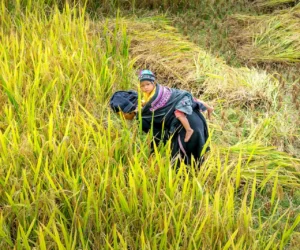
As the EU gears up to enforce the Deforestation-free Products Regulation (EUDR), Barry Callebaut is spearheading a movement that promises to revolutionize the cocoa supply chain, ushering in an era of unparalleled sustainability. Over the past year, we’ve redefined our approach, aiming not just for sustainability but for excellence that distinguishes us and drives the entire industry forward.
Our strategy mirrors the Regulation’s objectives, targeting deforestation, greenhouse gas emissions, and biodiversity preservation. By delving into our innovative practices rooted in robust sourcing principles, a dynamic due diligence toolbox, and proactive forest protection endeavors, we position ourselves at the forefront of cocoa sustainability.
The EUDR, a flagship initiative within the broader EU Green Deal, aims to make Europe the first climate-neutral continent. Effective from December 30, 2024, this Regulation seeks to curtail global deforestation, forest degradation, greenhouse gas emissions, and biodiversity loss. Covering seven commodities, including cocoa and palm oil, along with derived products like chocolate, it demands transformative action across respective supply chains.
What does the EUDR signify for the cocoa and chocolate sector? It guarantees that no cocoa associated with deforestation enters the EU market. For companies like ours, this translates to:
- Tracing cocoa to its precise origin.
- Ensuring compliance with national laws.
- Confirming that cocoa cultivation didn’t contribute to deforestation post-December 2020.
However, obtaining such detailed insights into cocoa production poses significant challenges due to the complexity of the cocoa supply chain. Cocoa cultivation often drives land use changes in forested areas, with a substantial portion of expansion encroaching upon forests. Moreover, the majority of cocoa is cultivated by smallholder farmers who operate across multiple plots, complicating traceability efforts.
To address these challenges, we’ve developed rigorous sourcing principles to assess deforestation risks in cocoa supply chains. This involves comprehensive country and sub-country analyses to evaluate present and future risks of forest conversion for cocoa cultivation. By combining this with supply chain assessments, we categorize sourcing areas into high, medium, or low risk, allowing us to tailor risk mitigation strategies accordingly.
In addition to sourcing principles, we’ve devised an advanced due diligence toolbox. This toolbox incorporates various protocols and tools to assess and mitigate deforestation risks, including the utilization of peer-reviewed land cover maps and real-time satellite monitoring systems to detect forest disturbances. We’re also enhancing our yield control system to prevent the infiltration of deforestation-related cocoa into our supply chain by implementing evidence-based regional yield estimates and developing a comprehensive grievance mechanism to address compliance concerns.
Furthermore, forest protection constitutes a fundamental aspect of our strategy. Studies underscore the efficacy of forest protection interventions in reducing deforestation risks. Accordingly, we’re committed to engaging in forest protection activities in cocoa landscapes vulnerable to EUDR non-compliance, solidifying our dedication to sustainability and regulatory compliance.




